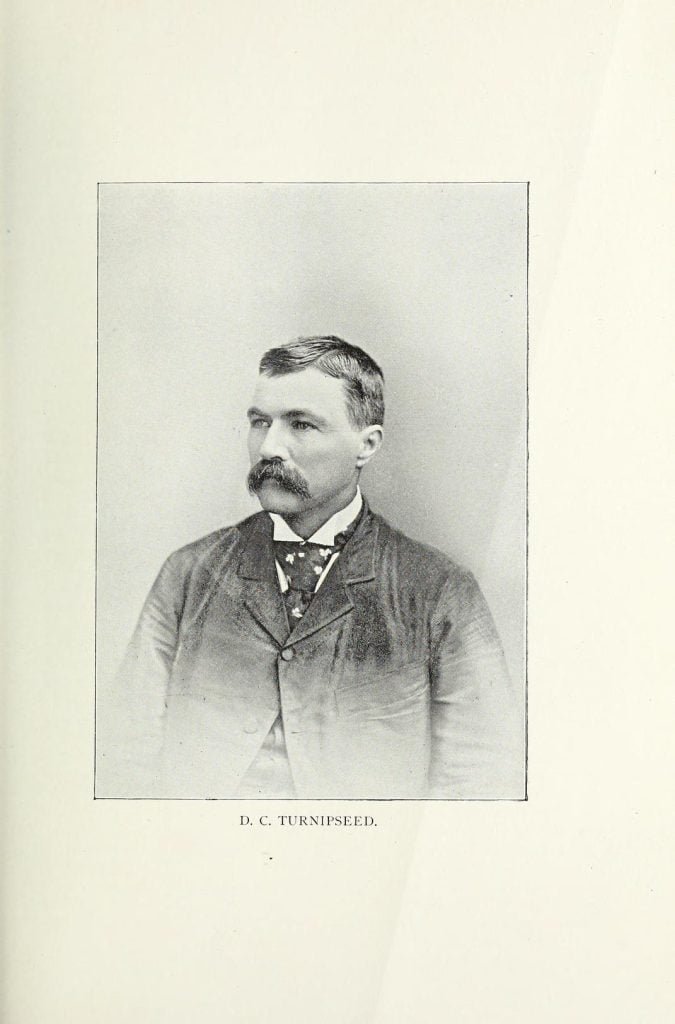David C. Turnipseed. – This thriving planter and fruit grower of Flora, Ala., was born in that part of Bullock county which was formerly known as Montgomery in 1846. His father, William Turnipseed, was a native of Edgefield district, S. C., born in 1815: he married Miss Edith Ryals, who was born in Averysboro, N. C., in 1814. They both came to Alabama with their parents, who settled in Montgomery county, about the year 1825, and were here married, taking up there residence in the woods on land entered from the government. Mrs. Edith Turnipseed died in 1858, and William afterward married twice-the second wife being a Miss Beverly, and the third a Miss Walker. William had been a life-long member of the Methodist church, but was not an enthusiast; he opposed secession, but avoided politics as a rule, being an industrious planter who wished to prosecute his vocation in peace. He died in 1891, after having amassed a competency. William was one of the pioneers of the county, having settled there when there were but two or three stores in the city of Montgomery, and the woods teeming with Indians and wild beasts. His father served in the Indian war of 1836 and suffered many hardships and privations during the earlier years of his residence here. He descended from an old revolutionary soldier – one of two brothers who came to America from Germany. David C. Turnipseed is the second of three brothers, viz.: John William, who died at Clinton, Tenn., in 1863, a soldier in Hilliard’s legion of Alabama troops, after a short term of service under Gen. Bragg in Kentucky. The youngest of the brothers, Henry Felix, is a planter of Bullock county.

David C. Turnipseed, whose name heads this sketch, was educated at home and at the state university but did not complete his collegiate course, owing to the breaking out of the late Civil war. After quitting school he farmed on his father’s place until his marriage, in 1877, to Orleania E., daughter of Col. N. G. and Mary Owen, natives of Georgia, but who became residents of Alabama and here ended their days. Mr. Owen was a prominent planter and at one time was a member of the state legislature from Macon county; also served in the Mexican war, with the rank of colonel. Mrs. Turnipseed was born in Lee county, Ala., and is highly educated. The young couple, after their marriage, resided near Mitchell station [Fort Mitchell, Russell County] until 1884, when they removed to their present place at Flora, which is one of the best improved and most homelike plantations in the country. Mr. Turnipseed started business with about $1,200 given him by his father, and Mrs. Turnipseed brought as her dowry about 300 acres; he now owns over 5,000 acres in different tracts, and is a progressive planter, who superintends his affairs in person, and hence his success. Since his settlement on his present place he has given a great deal of attention to fruit growing and Experimenting with many varieties of fruits and vegetables. He has forty acres set in pears of a choice variety, ten acres of which are in full bearing; he also has apples, peaches, apricots, figs, plums, prunes, cherries, blackberries, gooseberries, etc., also pecans, English walnuts, etc., and ten acres in mulberries, grown for his hogs, and altogether has probably a greater variety of fruits than any other man in the state. He is a thorough horticulturist, well qualified for making a success of his undertaking, having a complete set of water-works run by hydraulic ram. He is preparing to add a canning factory to his enterprise. His live stock is of the best grade and receives close attention. Both Mr. and Mrs. Turnipseed are members of the Methodist church and are sparing no pains in the education of their children. Their names are David C., Jr., Walter F., Wm. O. and Fletcher T. – the two eldest now members of the church.
